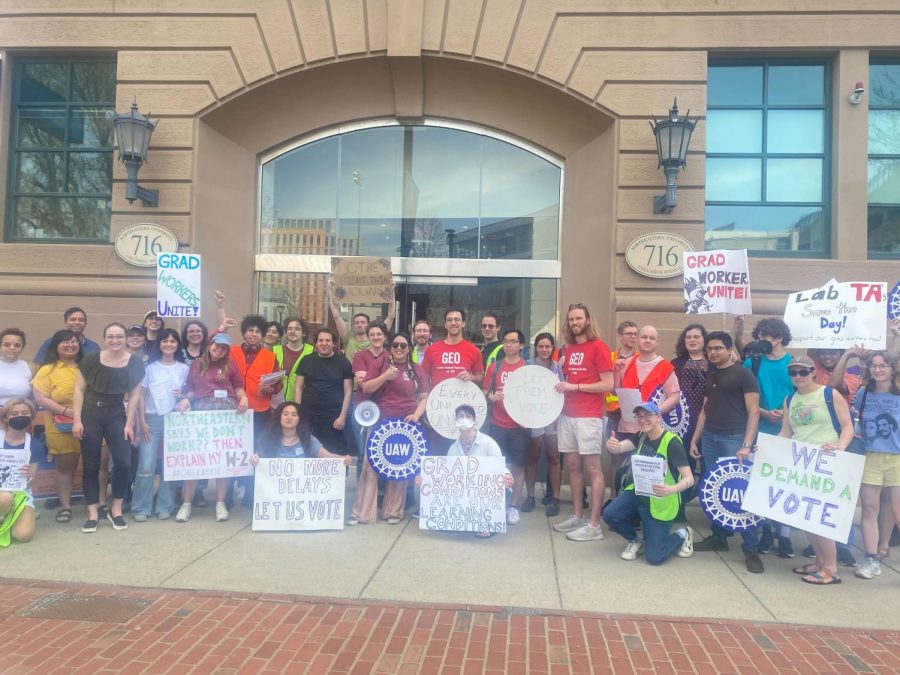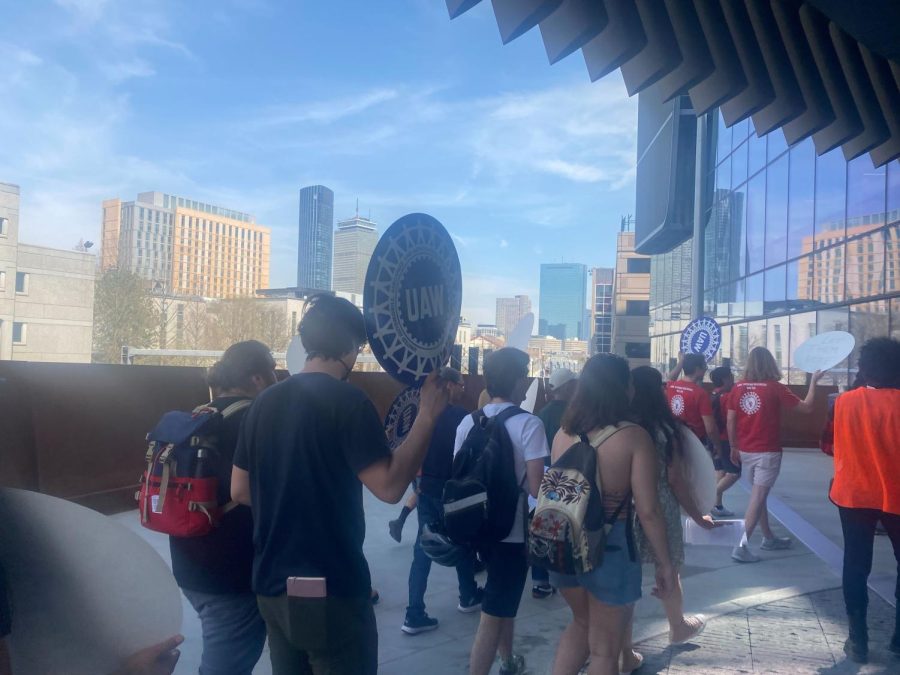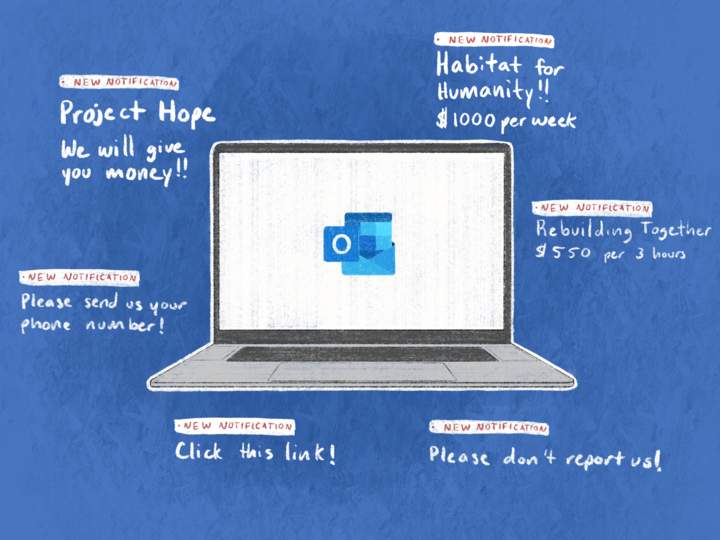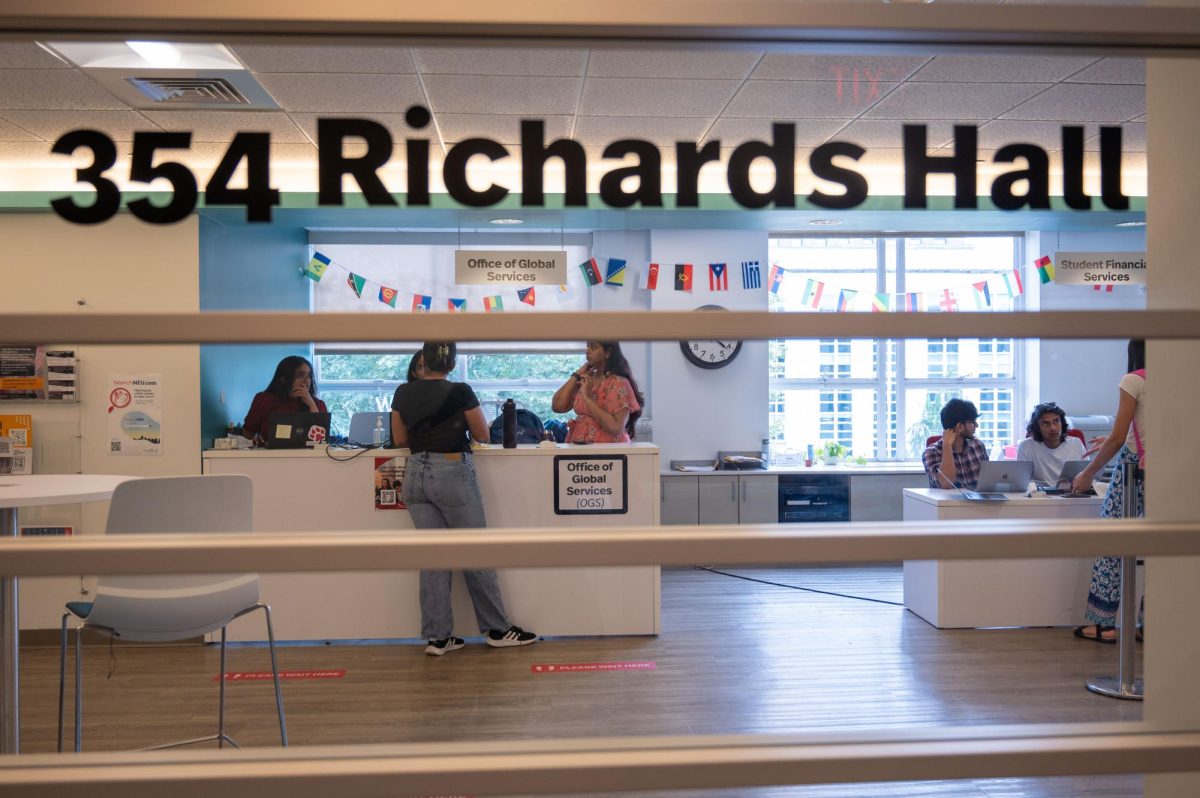The fight for graduate student workers continues with no sign of concession from Northeastern
Students at the April 14 graduate student unionization protest walk into ISEC. Demonstrators called for Northeastern to allow graduate students to unionize, which would give student workers more leverage to improve their working conditions at the university.
April 25, 2023
Kutub Gandhi says he is one of the luckier ones.
When Gandhi, a third-year computer science graduate student, is not doing his PhD work, he fulfills a mandatory role as a Research Assistant or Teaching Assistant for the university.
Unlike many of his peers, Gandhi does not have to worry much about the lack of financial support or protections Northeastern gives to graduate student workers. He is thankful to have accessible health insurance, something many of his friends cannot say.
“I’m in a pretty reasonable spot, but as I met more and more PhD students and started hearing stories about people having to make some really tough decisions about where to live, how to work, what to do — I started to realize this was a larger problem,” Gandhi said.
Many undergraduate students and members of the Northeastern community are unaware of the struggles graduate student workers face, and the overall lack of support they are given by the university.
For Gandhi, the moment the mistreatment of graduate student workers sunk in was when he saw how his friend and his partner, who have a child, were unable to afford childcare without assistance from Northeastern. As two graduate student workers, Gandhi said they feel financially unsupported in their personal lives while tirelessly earning money for the university daily.
Gandhi was one of the dozens of students that rallied April 14 to pressure Northeastern to stop the continued delay of the vote for graduate students to form a union. Protestors marched from Centennial Common to ISEC to demand accountability from Northeastern.

Graduate student workers have been vying for the ability to unionize since 2017, The News previously reported. The Graduate Employees of Northeastern University, or GENU-UAW, is a union of student workers who stand together to collectively improve working conditions at Northeastern, according to their mission statement.
Gandhi says the unionization process would give graduate workers a contract, allowing them to negotiate their working hours, sick days and disciplinary action for verbal harassment and sexual assault claims in a clear and documented manner.
David Madigan, provost and senior vice president for academic affairs, has sent several emails to the graduate student body over the past few years discouraging the continued effort to form a union.
In a Feb. 23 email, Madigan warned the graduate workers’ petition with the National Labor Relations Board, or NLRB, would force the university to disclose students’ personal contact information.
“Separate from any response to the NLRB subpoena, the university will oppose the union’s broad-sweeping information demand that is inconsistent with federal labor law and also seeks information protected by FERPA,” Madigan wrote.

Madigan’s email heavily emphasized Northeastern’s alleged effort to protect graduate students’ personal information, warning the students not to continue the fight to unionize at the risk of their FERPA rights being reversed, releasing educational records and information.
“If unionization isn’t in graduate students’ best interest, let the graduate students decide that,” Gandhi says.
Jane Adams, a second-year doctoral student in the data visualization lab at the Khoury College of Computer Sciences, also attended the graduate student union protest. Unlike other graduate students, Adams entered Northeastern with prior experience as a professional academic researcher.
“I was used to having good institutional support,” she said.
Between 2021 and 2022, Adams saw the general cost-of-living in Boston skyrocket — yet Northeastern offered no additional compensation to align with the sudden increase in rent and groceries, she said. Adams took out a student loan to offset her moving costs, only to have the loan reversed after purchasing a mover and being told she owed the money back immediately.
Adams expanded on frustrations with the university for using graduate students for labor as TAs and RAs, only to tell them they are students and should be grateful for the learning opportunity when they voice concerns.
Adams believes Boston is a “union town,” prided on union labor and academic standings.
“The reason the union protesting has been so aggressive is because Northeastern has been doing the institutional equivalent of that to us,” she said.
There are benefits that have come from unionizing at other colleges, such as Harvard student workers gaining 4% raises in pay and millions of dollars in funds to help offset costs for medical bills and childcare costs.
“I am personally in a stable spot — this is something I can advocate for,” Gandhi said.
Northeastern has been pushing back against the unionization efforts in ways that grad students describe as underhanded, such as attempting to reverse the Columbia decision, which gave graduate students the right to unionize in the first place.
“We were surprised and disappointed that this protest was scheduled at the same time the university held a tribute to honor the victims and heroes of the 2013 Boston Marathon bombing,” a spokesperson for Northeastern said in an email statement to The News about the April 14 protest. “Many in the Northeastern community were upset by this unfortunate overlap and we sincerely hope that the protesters will plan more thoughtfully in the future.”
Alex Madaras, a third-year undergraduate student majoring in history, culture, and law, is an organizer with Huskies Organizing with Labor, or HOWL.
Madaras works as a part-time undergraduate RA in the Network Science Institute, alongside graduate workers who are completing their research.
“It really pains me to see the university treat them poorly and not pay them enough or give them the medical and dental benefits they deserve,” Madaras said. “I feel like people should be able to go into higher education and get the degrees that they need to do well in their field and not have to sacrifice their quality of life.”
Graduate students and allies plan to continue voicing opposition to Northeastern’s policies — and hope that one day their rally for a vote will be the last one.







